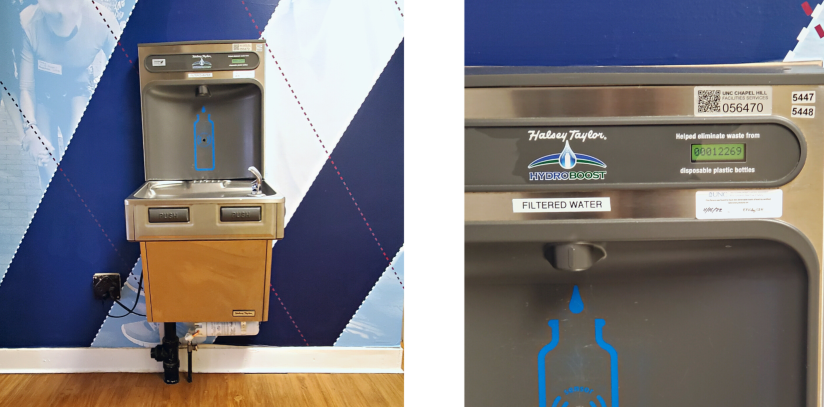The residence halls, like all of UNC-Chapel Hill main campus, receive tap water from the Orange Water and Sewer Authority (OWASA). OWASA’s water supply originates as rainfall within the Cane Creek and University Lake watersheds.
Fall 2022 Water Testing
In Fall of 2022, UNC-Chapel Hill became aware of elevated levels of lead in some of the drinking water fixtures across campus, both residential and non-residential. All drinking fixtures across campus were then tested for lead. This process was a comprehensive, campus-wide effort that included multiple units and relied on the input and guidance of our faculty experts and external organizations. Water testing data is archived on the EHS Website for campus members who wish to review it.
All of the drinking fixtures in the residence halls that tested positive for any level of lead have remediated, re-tested and show no detectable levels of lead. On the rest of campus, the remediation and corrective action for drinking fixtures that tested positive for any level of lead continues. If a building has a fixture set to be repaired or replaced, we have ensured there are alternative water fixtures that tested negative for lead available. Once fixtures are repaired or replaced, they are tested once again before they are put back in service.
Ongoing Testing
Moving forward, EHS will conduct lead testing in drinking fixtures in buildings built prior to 2014 every three years. This follows the 2014 revision of the lead-free definition for plumbing fixtures outlined in the Environmental Protection Agency (EPA) Safe Drinking Water Act. Water testing data from these efforts will be available on the EHS Website for campus members who wish to review it.
Filtered Water Stations
Lead filters have been added to at least one fountain/bottle filler per building. All upfitted units are identified by “Filtered Water” labels.
Water Filter Specifications
The following filters are in use in the residence halls.
Under sink: Frizzlife MK99 filter (https://www.frizzlife.com/products/mk99)
· NSF 42: NSF ANSI Standard 42 filters are certified as meeting the requirements for the reduction of aesthetic impurities such as chlorine and taste/odor.
· NSF 53: NSF ANSI Standard 53 filers are certified as meeting the requirements for the reduction of certain contaminants in drinking water, including asbestos bacteria, cryptosporidium oocysts, radon, lead, mercury, and VOCs.
Fountain/Bottle Filler: Elkay EWF172 filter (https://www.elkay.com/products/details/ewf172)
· NSF 372: NSF ANSI Standard 372 filters are certified as meeting a weighted average lead content of ≤0.25% when used with respect to the wetted surfaces of pipes, pipe fittings, plumbing fittings, and plumbing fixtures that come into contact with the drinking water.
· NSF 42: NSF ANSI Standard 42 filters are certified as meeting the requirements for the reduction of aesthetic impurities such as chlorine and taste/odor.
· NSF 53: NSF ANSI Standard 53 filters are certified to meet the requirements for the reduction of certain contaminants in drinking water, including asbestos bacteria, cryptosporidium oocysts, radon, lead, mercury, and VOCs.

